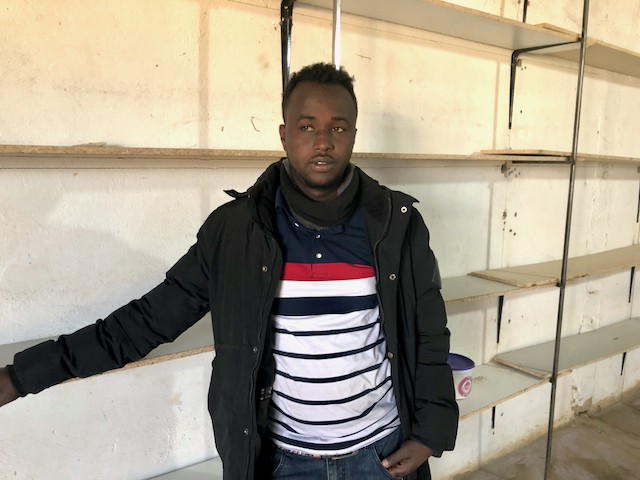Small businesses in Gauteng may never open again after July riots
Shopkeepers say they are unlikely to be able to access relief funds
Omar Osman recently finished cleaning up his electrical shop after the looting in Brakpan in July cleared him out of R200,000 worth of stock. Photo: Kimberly Mutandiro
- Many small shops in Nigel, Brakpan and Springs looted in the July unrest have still not reopened.
- The shopkeepers say they are personally devastated and they have no funds to restock.
- Small business owners we spoke to say they doubt they can meet the criteria for relief funds.
Numerous shopkeepers in Nigel, Brakpan and Springs, whose businesses were looted in the July unrest, have still not reopened, a month later. Owners GroundUp spoke to say they are not sure if they will ever recover. Some say they have no idea where to begin or how to access support funds. Many doubt they can meet the criteria required for relief funding for SMMEs.
Omar Osman recently finished cleaning up his electrical shop after the looting in Brakpan. He says he lost R200,000 worth of TVs, radios, speakers and fridges. None of it has been recovered. The shop was stripped bare. Even the security door was taken. He also has to rewire the shop.
“I visit my shop every day and look at the empty walls. The same walls used to hold my livelihood and that of my family. All was lost,” said Osman. “I will have to starve until l can reopen my business, but who knows when.”
With no adequate business documentation, he says he has not been able to secure a loan to help rebuild.
Rubel Rubel, who had a small supermarket in Kwathema, Springs, said, “I have not even found the strength to clean my shop, as l do not know where to start.”
“Even if l was to get a loan, how will l pay back as l do not even have collateral? It takes years to build a supermarket business and the profit we make per grocery item is R2 to R5, at most.”
Rubel was relying on his business to look after his family back home in Bangladesh.
“By looting my business, they destroyed everything including my family. To be honest, l do not know what l will do now.”
Ronny Mohammed has given up ever reopening his grocery shop in Springs. “I do not even know how l will eat or survive. That is how bad it is. Some of us may never recover from the looting.” he said.
Carol-Ann Edwards, the owner of Freedom Bottle Store in Duduza, Nigel, says over R300,000 of stock was looted. Everything was stolen, including the fridges and even the burglar bars. She is yet to recover from the trauma and she has not yet reopened.
“I was numb for days and would not even take any calls. I felt like l was the villain. What did l do to deserve this? Why did police who were a meter away from my shop, not prevent this?”
Edwards is a retired accountant and a pensioner. Her business was barely a year and a half old and struggling because of the pandemic. Most of her money went into the stock.
“Everything l ever worked for was reduced to rubble in a flash. I get so emotional,” she said.
Her employees are also affected. “One of them is a single mother and has no one to help her. l’ve had sleepless nights worrying about what will happen when the small money l have left runs out, such that there is nothing left to give my employee,” said Edwards.
Edwards received new fridges from Heineken who also helped her clean up and rebrand the store. Her landlord has also agreed to defer rent.
Edwards said she has looked into the small business relief funding but doubts she’ll meet the “stiff” criteria.
Although Edwards is determined to find a way to re-open her store, she fears it may be looted again. “We live in a country where people are hungry and unhappy and feel they have nothing to lose if they riot. I can only pray to God that we will be able to get back to where we were.”
Ministry of Small Business Development head of communications Sendra Mashego said unregistered businesses (not registered with CIPC and SARS) fall under support for informal traders. These applicants would have to be South African citizens and financial support will be a R3,000 once-off grant per informal trader. A total of R40 million has been made available.
Outside of this, uninsured small enterprises looted or vandalised during the July 2021 unrest can aply to the Department of Small Business Development for business recovery support packages by 20 August.
The criteria for small business relief include providing 13 different type of documents as the following extract from the government’s application form shows:
Next: Eastern Cape village without water since 2019
Previous: Mother without ID struggles for years to enrol children at school
© 2021 GroundUp. This article is licensed under a Creative Commons Attribution-NoDerivatives 4.0 International License.
You may republish this article, so long as you credit the authors and GroundUp, and do not change the text. Please include a link back to the original article.
We put an invisible pixel in the article so that we can count traffic to republishers. All analytics tools are solely on our servers. We do not give our logs to any third party. Logs are deleted after two weeks. We do not use any IP address identifying information except to count regional traffic. We are solely interested in counting hits, not tracking users. If you republish, please do not delete the invisible pixel.




